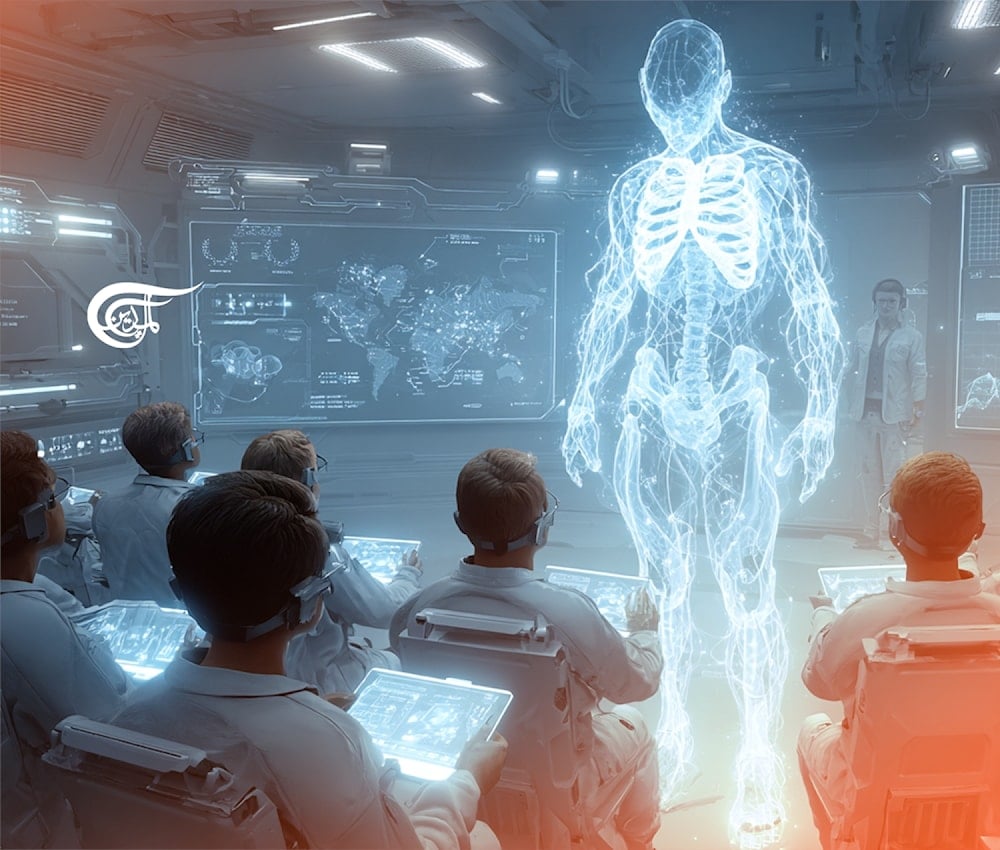Learning to Talk to AI: Communicating Well and Ethically with AI as an Educational Aide
AI can enhance education if used ethically and effectively, with clear prompts and human guidance, augmenting, not replacing, teachers and supporting student learning responsibly.
-

AI in education has vast potential, but ensuring its application is aligned with fairness, security, and human values is another story (Illustrated by Mahdi Rteil to Al Mayadeen English)
Artificial intelligence livestream (AI) is making its way to every corner of mainstream and industry sectors, including education. AI tools offer tantalizing prospects — from adaptive learning platforms to administrative automation. But the real value from these technologies depends crucially on two things — whether we know how to communicate with them, and whether we’re willing to wrestle with the mess of ethical complications they bring. Knowing how to "speak" to AI through good prompting, and defining boundaries for ethical use, for AI to be just a supporting presence and not a human substitute, are crucial, particularly in education. Through mastering these communication skills and applying a principled approach to ethics, we can ensure AI becomes a powerful aide that truly enhances human skills and makes the educational experience more rewarding for everyone involved.
Whatever the context of the phrase that gets you what you need, interacting affirmatively with modern AI, especially LLMs (large language models), is more of an art than plain order-giving. That’s the circle of prompt engineering, life, or the art and science of creating good inputs (or prompts) to direct AI models toward generating desired, accurate outcomes that can help people. Just like how clear communication is critical between two humans, precise prompting is important for unlocking the potential of AI. Ambiguous or imprecise queries often result in non-specific, irrelevant, or wrong answers.
There are several key strategies to good prompt engineering. This is, first of all, about being very clear and very precise: You need to tell the AI exactly what you mean, and not use any shorthand, slang, or even idioms that the AI may misunderstand. Secondly, providing context is vital. Providing the AI with relevant context or background information, such as who the target audience is, or what the purpose of the task is, is like giving the AI a map, with which it can make better decisions on how to effectively navigate the request. Providing a role (e.g. “Pretend you are high school history teacher”) to respond to can also greatly influence the tone and response. In addition, requesting the desired format or restrictions (bulleted list as opposed to narrative descriptions, word limits or a type of citation format) serves to align what you expect to receive (DigitalOcean Best Practices). And, lastly, it doesn’t hurt to get comfortable with iterative refinement. Treat this interaction as a conversation, where you tweak the prompt if it doesn’t come out quite the way you intend, gently steering the AI to the goal you have in mind. There are a ton of resources out there such as Learn Prompting and tutorials from platforms like freeCodeCamp, which offer pathways to develop these essential skills.
EDU AI-The Assistant Paradigm
In education, the primary ethical and practical use case for AI is as a helper, an enhancement to, rather than a replacement for, human educators. AI has many possibilities as a teacher’s assistant when it comes to automating some of the more tedious admin tasks. Tools like Eduaide.AI play a role in generating a first draft for a lesson plan, designing differentiated learning materials, developing discussion questions, or even drafting an email. All things that ideally would be time spent working directly with students and providing targeted support. AI can also serve as a formidable student support material, offering personalized practice exercises at their own pace, immediate feedback on types of assignments, or a brainstorming partner. (Reddit discussions highlight various uses).
But we also have to understand the uniquely human aspect of education. AI, no matter how sophisticated, cannot replace the empathy, mentorship, sophistication, and social-emotional connection that is central to effective teaching and learning. AI will not replace teachers, as Colin Cooper writes, but it can take on tasks that never should have been strictly theirs. Studies have demonstrated that, like all e-learning platforms, AI is missing the critical human touch necessary for well-rounded learning experiences (Walden University Study). Replacement is not the goal; augmentation is. By achieving rote tasks, what AI affords educators is the ability to concentrate on skills that are higher order and require judgement, critical assessment, original thought, and tailored support, which makes a difference to student development (Bizzuka analysis).
Moreover, educators help students learn how to responsibly use AI tools as learning aids – for topics to research, concepts to clarify, or writing to feedback upon – not crutches to sidestep learning and critical engagement.
The Moral Pitfalls of Being Aided by AI
AI in education has vast potential, but ensuring its application is aligned with fairness, security, and human values is another story. Algorithmic bias is one big concern. AI systems trained on biased data can unintentionally reinforce or even exacerbate current societal inequities, further disadvantaging some groups of students (PowerSchool Guide). Fairness is not assured; AI tools and their outputs must be constantly monitored and scrutinized. Privacy and security of personal data are equally important. AI in Education often needs access to student data, which could be sensitive to some extent, and there is a need for strong protections of student data and clear data usage policies.
Some AI systems are opaque, and therefore decision-making is hard to comprehend, which raises issues for responsibility. It is essential that we encourage the adoption of AI solutions that are designed to be explainable (Inspera Insights). Academic integrity is another concern; we will need clear policies regarding the legitimate use of AI in assignments to minimize cheating and to maximize the student investment in skill development (KU CTE Guidance). And, of course, we need to address equity and access. We must not allow AI to exacerbate the digital divide, which still exists among students, and all kids should have access to the pluses of AI (Educause Review).
To rise to these challenges, we need active solutions. Colleges should have transparent, inclusive policies for the use of AI (UNC Charlotte Teaching Support). Both teachers and students must be trained in ethical AI use and how to critically evaluate AI-generated content (Foundry10 Tips). Teachers can exemplify responsible and transparent uses of AI (MIT Sloan Strategies), and organizations can value picking AIs in the first place that are based on ethical grounds.
Conclusion
Realizing the potential of artificial intelligence in education, and far beyond, is not just about deploying technology. It is a skill for them to acquire — learning to speak in prompts — and to do so, you need to have a strong ethical foothold on human well-being and on what makes us feel that we are doing something in the classroom. By viewing AI as an advanced assistant rather than a threat to replace them, teachers-to-be can utilize the power of AI to enhance what they do, assist students in learning in novel ways, and concentrate more on the important human elements of their essential profession. AI promises to be a powerful co-worker, but only under human guidance, transparent communication, and ethical conviviality.

 Ahmad Hassan
Ahmad Hassan
 7 Min Read
7 Min Read







